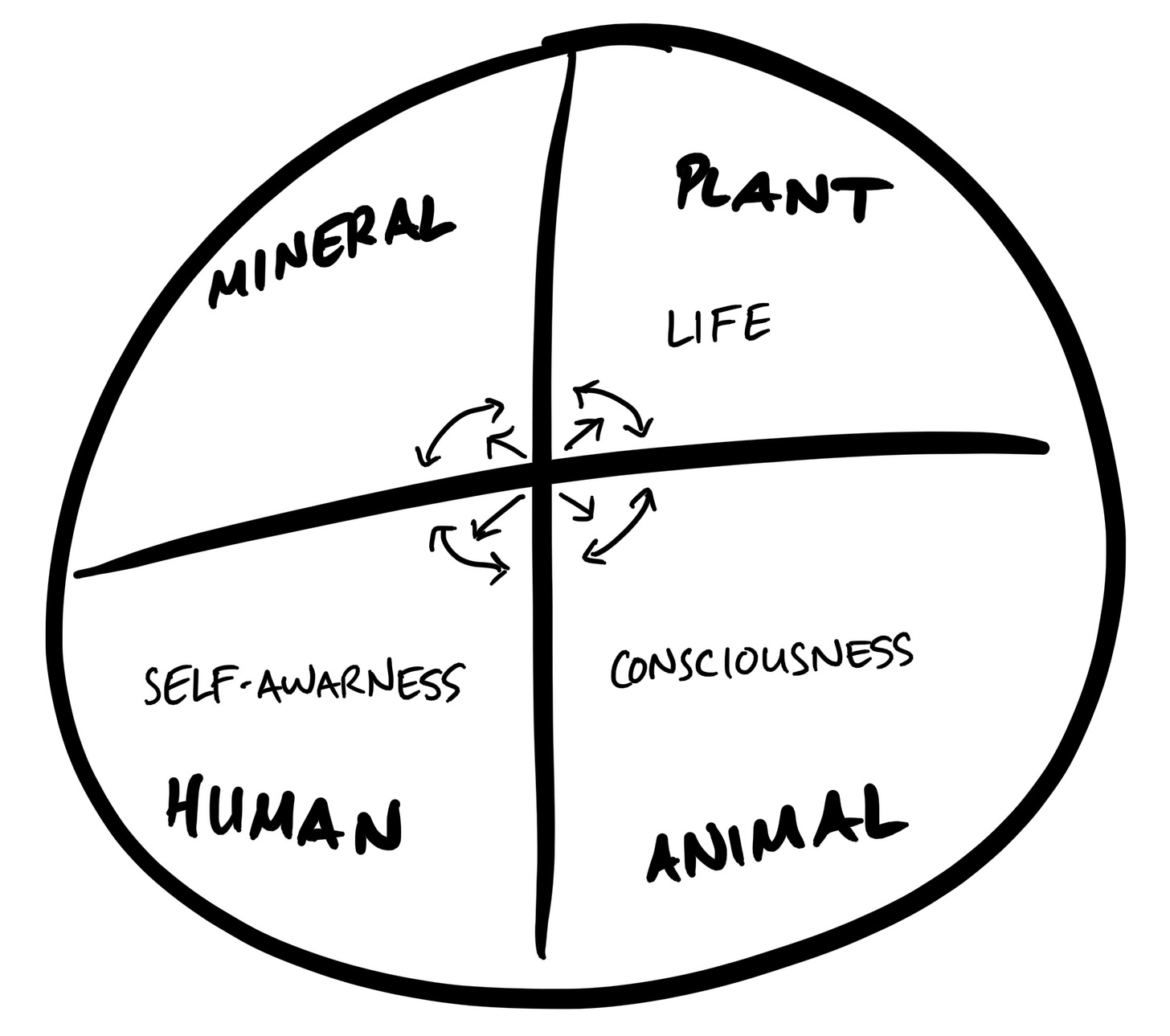You know in your heart you’re part of something bigger.
The world as a living being - one nature, one soul. Keep that in mind. And how everything feeds into that single experience, moves with a single motion. And how everything helps produce everything else. Spun and woven together.
Marcus Aurelius, Meditations
There’s a danger when we start to think of levels. Instantly, the idea of progressing through them comes to mind. We know we’re ‘winning’ when we make it to the label on the right-hand side (it’s always the right-hand side that’s the most valued - sorry lefties). And so we get better by leaving things behind. Separateness is emphasised.
The way we write it and draw it doesn’t help.
Don’t think for a minute that movement across the Levels of Being means leaving the other stages behind. This is not a case of linear evolution, where I was, but now I am is the framework for thinking about progress. We don’t just want arrows pointing to the right.
No, this is a framework where we must think in terms of I am this and also that. Not separate. Yes, there may be thresholds to cross, but they are interdependent: eg, I cannot be conscious without also possessing life.
I wonder if it would be more helpful to draw the framework differently?

Does this picture shift how we can think about a holistic education?
It occurs to me that there is the possibility of movement across the thresholds in any direction when we adopt this perspective. Instead of being hurdles to leap, they become porous boundaries to be crossed at will, at any time, in any direction. Thus, becoming ‘complete’ or ‘whole’ becomes a relational process - the development of my self-awareness cannot be wholly focused within and anchored in my desires, it cannot be exclusively ‘human’ centred.
No, my self-awareness is grown through an awareness of how I relate to the other sectors (levels). It’s in the encounters, and my experience of them, through my participation, and reflection on it, that I am able to become ‘whole’.
Kids know this on an intuitive level. That’s why it’s so hard to hold them back from digging in the dirt, from splashing in puddles, from loving animals, from picking flowers, from climbing trees.
It’s the adults who have forgotten it. Despite all our talk about wellbeing and being holistic, we sit all our thinking about these in the human sector: goals, grades, ambition. In doing so, we convey a message that looks like this.
And we wonder why we’ve got a growing mental health crisis in our kids? Surely, in squeezing out, in reducing the relevance other the sectors that make up our world, we have dislocated them from a way to feel whole.
Is this not why play is essential? Especially outdoor play, for kids of all ages, because it so readily connects us with all the sectors of being.
In last week’s post I offered the phrase ‘participatory encounters’. I wonder if we can think of the phrase as way to help us see what a journey between the sectors might open up for learning and even the purpose of learning (and maybe even school)?
The kid immersed (ha!) in water play is having a deep (haha!) encounter with the mineral sector. The kid who starts a garden is immersed in the plant sector. The kid who starts dog club is deep in the animal sector.
If you pay attention you’ll be able to see how those encounters are anchored in participation, and that it’s this that is growing their self-awareness.
A test won’t show you that. Nor will sitting kids in rows day-after-day, hour-after-hour.
No, you have to get them involved. That’s not hard - they want to be. Once they’re involved, things become play very quickly.
A kid keeps filling a bucket and tipping it down a chute they’ve constructed, screaming with delight each time something different happens. What human, self-awareness-building story can you tell about that encounter?
A kid tends to the garden every day, rain or shine. What human, self-awareness-building story can you tell about that encounter?
A kid arranges for dogs to come to school during exam time so other students can sit with them and relieve some stress. What human, self-awareness-building story can you tell about that encounter?
Marcus Aurelius knew. It’s in the spinning and weaving together that we become whole.





